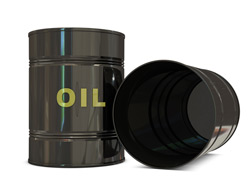Oil Spikes As Western Military Intervention In The Syrian Conflict Appears Increasingly Likely. Soc Gen Predicts Price Could Rise To $150 Per Barrel.
The Dubai stock market picked up where it finished yesterday by dropping almost 6% shortly after the market open, taking the cumulative losses this week to circa 13%. The current level is still some distance from the circa 60% returns the market has delivered to date in 2013, but several more days of the same repeated sell off pattern could cause many investors to flee the DSM in preference for safer havens.
Oil rises as Soc Gen predicts $150 per barrel
Oil speculators always thrive in times when threats of military action become louder, even more so when the talk turns to actual strikes. WTI and Brent crude have spiked over recent days, but it could get a lot ‘worse’ according to a memo circulated by the French bank Societe General. They’re predicting that should NATO and or the USA take military action versus Syria then the price of WTI could spike to $150 per barrel, an incredible reward for speculators who stay long in the commodity, but an absolute disaster for the fragile economic recovery currently underway in Europe and the UK given their extremely poor energy supply and security issues.
[quote]”Base case scenario. $125 for Brent. We believe that in the coming days, Brent could gain another $5-10, surging to $120-$125, either in anticipation of the attack or in reaction to the headlines that an attack had started. In our base case, we assume an attack begins in the next week. Upside scenario: $150 for Brent If the regional spill over results in a significant supply disruption in Iraq or elsewhere (from 0.5 – 2.0 Mb/d), Brent could spike briefly to $150.”[/quote]
Germany’s import prices falls by 2.6%
German import prices have fallen by 2.6% in July, which in turn could result in German manufactured goods, the main stay of the German economic, becoming cheaper should that ‘saving’ be passed along the chain. The lower import price could also lead to cheaper retail costs for German consumers leaving them more to spend or indeed save. However, should the European region become the victim of a sustained spike in the cost of oil that model could be ruined inside weeks.
[quote]”The index of import prices fell by 2.6% in July 2013 compared to the corresponding month of the preceding year, as reported by the Federal Statistical Office (Destatis). In June 2013 the year-on-year rate of change was –2.2%, in May 2013 it was –2.9%. From June 2013 to July 2013 the index rose by 0.3%. The index of import prices, excluding crude oil and mineral oil products, was 2.7% below the level of a year earlier (–0.5% compared to June 2013). The index of export prices fell by 0.9% in July 2013 compared to the corresponding month of the preceding year”.[/quote]
India’s rupee continues its free-fall slump
The Indian Rupee plunged once again, by circa 3.88% today, the largest single-day collapse in the Rupee’s value since March 1993. Indian citizens have now lost 30% of their global purchasing power since March 2013, a situation generally only replicated by countries in military conflict, enduring sanctions, or undergoing huge transition.
Market snapshot at 10:30 am UK time
In the overnight/early opening session the main Asian markets closed down, the Nikkei closed down 1.5%, the Hang Seng closed down 1.60%, the CSI down 0.55%. The ASX closed down 1.05%.
European markets are down, but so far have not continued the more severe sell off experienced in yesterday’s trading sessions; the UK FTSE is down 0.36%, the DAX down 0.55%, the CAC is up marginally by 0.06%, the Athens exchange is up 0.32%, whilst the Istanbul stock exchange is down 1.15%, the majority of the index readings are far better than the equity index futures predicted late yesterday.
Looking towards the USA open the DJIA is up 0.20%, the SPX up 0.25%, whilst the NASDAQ is up 0.25%.
ICE WTI oil is up 0.81% at $109.89 per barrel, NYMEX natural is up 0.06% at $3.53 per therm. COMEX gold is up 0.39% at $1425.8 per ounce, whilst COMEX silver is up 0.55% at $24.84 per ounce.
Forex focus
Sterling fell 0.3 percent to $1.5497 early in the London session after dropping to $1.5482 yesterday, the lowest level witnessed since Aug 14th. Sterling depreciated 0.2 percent to 86.29 pence per euro, the weakest level since Aug 7th. The pound weakened for a second day versus the dollar as investors await the Bank of England Governor Mark Carney to deliver a speech with speculation growing that he will affirm his intention and commit to hold borrowing costs at an all-time low of 0.5% for some time under his ‘forward guidance” remit.
The Australian dollar slid 0.9 percent to 89.08 U.S. cents late in the Sydney session after touching 89.02 cents, the lowest level seen since Aug 5th, when it dropped to a three-year low. The Aussie touched A$1.5031 per euro, the weakest level seen since May 2010, before trading 0.8 percent lower at A$1.5023.
New Zealand’s currency reached 77.48 U.S. cents, the weakest level seen since Aug 5th, before buying 77.60 cents, 0.5 percent lower from yesterday’s close. The Australian dollar dropped to a three-week low as global equity declines curbed any demand for higher-yielding assets due to the prospects of military action against Syria.






